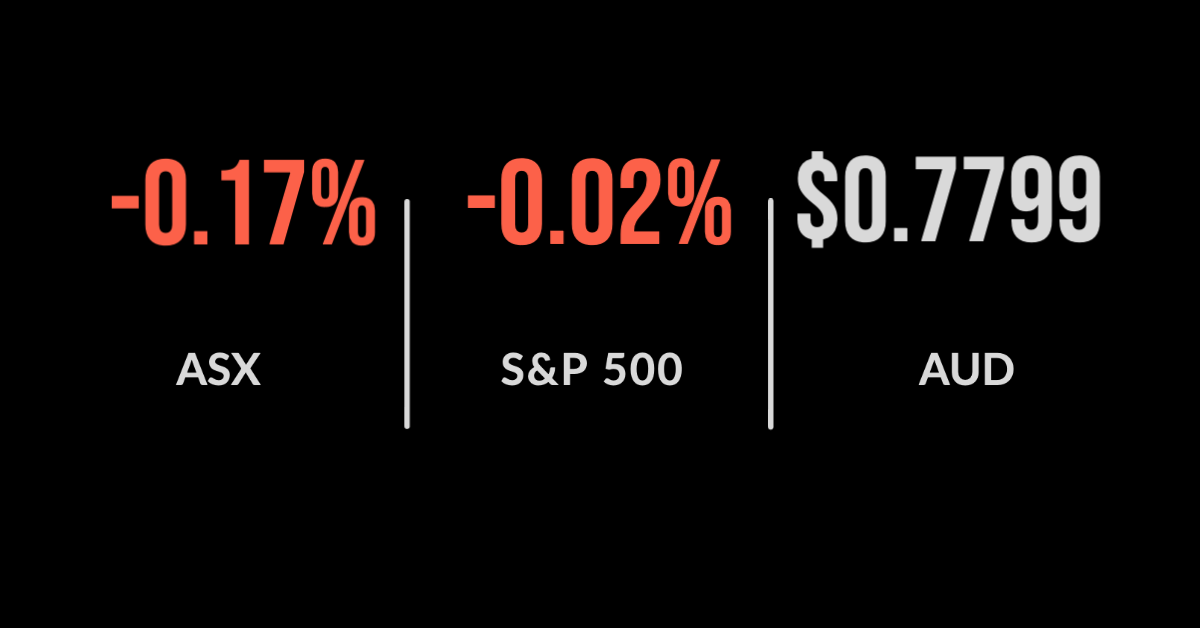Tech stocks dive as ASX records back-to-back losses
ASX stagnates at 7,000, Tabcorp receives another bid, Bingo deal approved
The ASX200 (ASX:XJO) remains stubbornly anchored to the 7,000 point level, falling 0.2% on Tuesday as most sectors were once again hit by the threat of increasing inflation.
The materials sector was the biggest positive contributor, with the likes of BHP Group (ASX:BHP), Rio Tinto (ASX:RIO), and Fortescue Metals (ASX:FMG) all adding 1% on the back of Vale’s quarterly earnings update (more below).
Tabcorp Holdings (ASX:TAH) jumped 4.2% after informing the market that Entain (LON:ENT) Group had increased their offer for the Wagering and Media business to around $3.5 billion despite still not being granted due diligence.
Activity in the waste disposal sector has continued, with Bingo Industries (ASX:BIN) entering into a sale deed with Macquarie’s Infrastructure and Real Asset (MIRA) division at a price of $3.45 per share; the stock jumped 6.3% on the news.
It appears Dexus has been successful in its pursuit of the AMP Capital Diversified Property Fund, with the two groups set to merge and Dexus offering to provide $400 million in liquidity for those still wishing to redeem their investments; AMP (ASX:AMP) fell another 1.8%.
Plumbing supplies remain strong, Aussie dollar bites, strong steel prices deliver for BlueScope
BlueScope (ASX:BSL) continued its solid run with huge infrastructure projects boosting steel demand, forcing management to upgrade their earnings expectations from $750 to $830 million to $1.0 to $1.08 billion for the second half of 2021. Steel prices continue to rise strongly as supply remains under pressure.
Plumbing supplies producer Reliance Worldwide (ASX:RWC) confirmed that sales had reached $359.4 million in the March quarter, more than 14% higher than the corresponding period.
The group has been a more cyclical beneficiary of the ‘Stay at Home’ trend of 2020, with more people in the US and Australia renovating their homes.
In constant currency terms US revenue was up 39% and Asia 11%, however, the stronger AUD has impacted the translated profit.
Management highlighted recent increases in copper and zinc costs, in the first signs of cost inflation, however, they expect to be able to pass these onto customers.
Earnings season to peak, input costs adding to inflation concern, markets weaker
The Nasdaq finished 0.3% higher ahead of key earnings reports from Microsoft (NYSE:MSFT) and Alphabet (NYSE:GOOGL) which are expected to show strong growth but with all eyes on the outlook for the remainder of the year.
The Dow Jones and S&P500 managed a flat finish, as key consumer focused companies reported.
The sprawling General Electric (NYSE:GE) conglomerate reported a 12% fall in revenue to US$17 billion, with their industrial products and aviation businesses the biggest detractors.
According to management, an 8% drop in orders was due to the company selling large, expensive equipment, hence making it a long not short cycle business that would benefit from the pandemic. On the positive side, GE’s renewable energy division grew revenue by 2% and narrowed its loss.
3M (NYSE:MMM) shares fell over 2% despite delivering its biggest quarterly earnings outperformance in over a decade.
Sales in their industrial product business, including PPE equipment jumped 14% on 2020 levels, transportation and electronics were 13% higher and consumer sales including Post It notes grew 10%.
Of biggest concern for investors were comments that management was beginning to see cost inflation on their key raw inputs.







